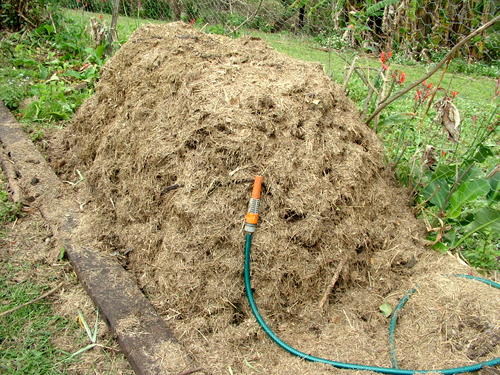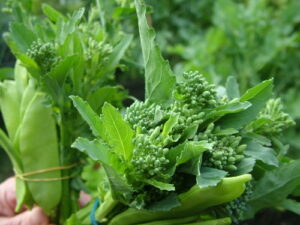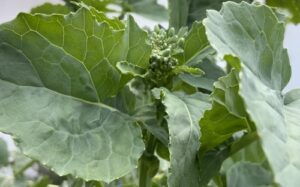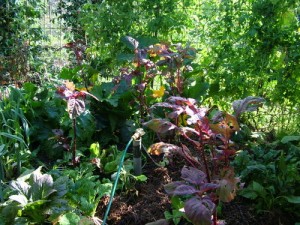The first compost pile of the season, and it’s a good one. It’s a lasagna pile with nice thin layers, with mulch from the Mulch Mountain every second layer.
It only took me an hour to build, but only because I have been routinely on the lookout for the ingredients, bringing home a bag of horse manure whenever my neighbour puts some out on the roadside for sale ($3 a bag), collecting a bucket of cow manure whenever I see cows out on the road reserve on my way home (I keep a bucket and shovel in the car for just this chance), collecting seaweed at the beach, cultivating the herbs and weeds I know are micronutrient accumulators, and lately making my morning walk over to a neighbour’s dam to collect a barrow of azolla. They all took time, but it was kind of incidental time.
The major ingredient was the mulch, and there’s about an hour’s worth of mowing in the pile. But you could almost call it “incidental time” too, a byproduct of my Mowing Meditation.
It goes:
- Layer of mulch, then layer of horse manure
- Layer of mulch then one of azolla
- Layer of mulch then one of cow manure
- Layer of mulch then one of green herbs and micronutrient accumulators (including nettles),
- the whole lot wet down with the last of the Seaweed Brew, diluted 1:20.
I will turn it twice, next weekend and the weekend after, wetting it down again, breaking up any clumps, moving the outside to the inside and introducing more oxygen. It will take about an hour’s work with a pitchfork each time. But it’s a good investment. This pile will keep the shadehouse and planting out going all summer. I’ll build another one in autumn to keep me going for the winter. That, and the sheet mulching done by the chooks is most of my garden work done and dusted.
I am using it to clear a new bed along a fence, hoping to cover the fence with a perennial climber like Scarlet Runner Beans, or maybe passionfruit. But first I need to get rid of the cannas and the stinging nettle and the nut grass along the fence. A good compost pile will get hot enough to kill everything under it. As I turn the pile along the fenceline, I’ll cover where it was with a good thick layer of mulch and plant my seedlings into it (in little wire cages to prevent the bandicoots digging them straight back up again every night).
Happiness is a good compost pile.




Mmm, I can almost smell it. I practise mowing meditation too. It’s some of my favourite time. Think I will have a go at some meditation today – hopefully just in time for some rain.
That is certainly a heck of a compost pile! Great to see how you construct…we were thinking of doing something similar but i have been worried about snakes crawling in ….do you ever find that?
Jode x
Hi Jode, snakes do like the warm, it’s true. I had a red bellied black snake living in and around my compost pile a few years ago. Luckily very shy – it took off whenever it saw me, but still meant I had to look where I was going. It’s one of the reasons I don’t mind the carpet snakes being around – they compete with and see off the more dangerous species.
I love this idea for clearing the fenceline Linda! I get so many good ideas here, just wanted to say ‘thanks’.
You’re welcome!
Linda you mentioned the dreaded nut grass! I’m using the mandala system you described in your book and this year the nut grass has taken over the whole circle. The chooks eat the tops, but can’t get down deep enough for the nuts, and they’re only there for 2 weeks twice a year. Is there anything you can suggest other than digging it out myself … endlessly, because I can’t get all the nuts. Please wave your magic wand and grant me a solution.
Thanks Linda….think i am going to have to get over this snake fear!!
Hi Tulipwood, don’t try to dig it out. That’s neverending – you just spread it. I remember setting myself the task of digging nutgrass out once, years ago. I resolved I’d be patient and just remove every single nut. Took forever and I think I ended up with more than I started with! The nut-grass go-forth-and-multiply strategy is to send out an underground runner, looks for a good spot to pop up, if it finds light, it photosynthesises some carbohydrate, creates a nut as a food store to send out another runner from. If the nuts aren’t sending out runners, they can go dormant and last for ages. But they don’t have enough stored carbohydrate to have more than one or two goes at sending out a runner. So I find if I do the initial clear of the tops with chooks or compost, then nice deep mulch layer immediately after. A bit of water and all the underground nuts try to send up shoots. If the mulch is deep, they have to use a lot of energy to get the shoot up to light, and if I immediately cut it off, it may have one more go but it is likely that nut is finished. You can cut off lots at once using a sharp shovel along the surface of the ground under the mulch layer. Not digging, just cutting. Chooks will do the picking too if you leave them on a bed with a deep mulch layer. You have to be diligent for a couple of weeks, stop it successfully getting any shoots up and photosynthesising. Hope that helps.
It’s the one thing we haven’t managed to do well! All our scraps go to either the worms or the chooks, and we struggle to find the space for a decent compost heap. We’ll have to try harder!
Orgasmic! I always lift the carpet on top of the compost v e r y carefully, I just know I am going to have a slippery visitor there one day…but hey, they are more scared of me than I am of them (I think/hope).
I do think scraps are better going to worms or chooks. Kitchen scraps don’t make good compost on their own, only as a minor ingredient in a pile with a lot of high carbon ingredients. Chooks and worms do most of my compost making too – I only make a couple of piles a year – they take too much work to do all the time – but it is useful to have a pile for making potting mix.
Thanks Linda – I’ll definitely give that a go with the nut grass. You’re right about having more then you started with when you try digging them out …it just seems to give them more resolve to reproduce!
Pingback:Roots and Perennials Planting Days in Early Summer
Hi Linda. I have made two attempts at composting. The 1st failed from heat loss.. windy weather & no cover over it. The next I just threw together while cleaning up the garden and it cooked really well, but did not follow through with turning as we got busy with a big farm agenda. My question is … can I still use this pre-composted material for anything? Could it be incorporated into a new compost pile to finish its process? What would you do?
Hi Leslie, if it cooked, it should be seed free and ready to go. If it still looks partly done, you can definitely use it as material in a new pile. What to do depends on what it looks like, whether it is too wet, too matted down, too fluffy, too dry…
Excellent Linda !! I will see what I find when I pull it apart.
Thanks so much for your help.